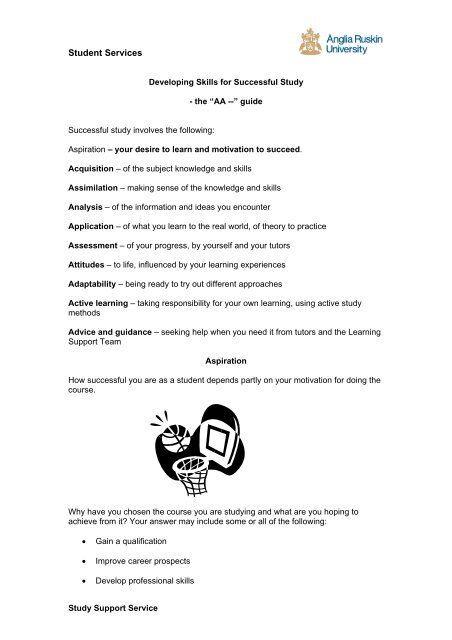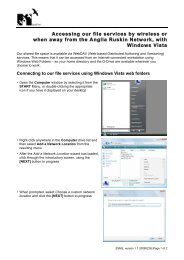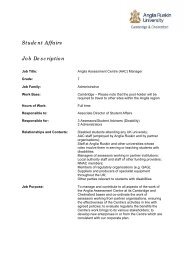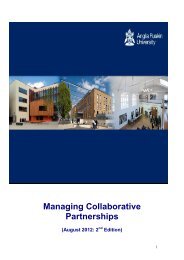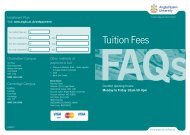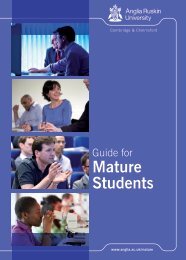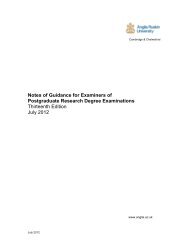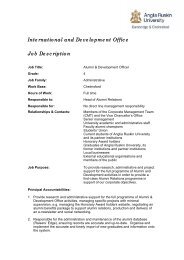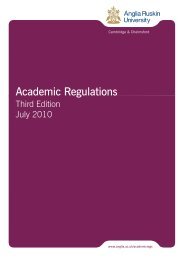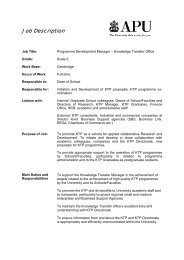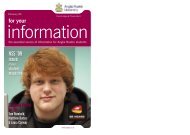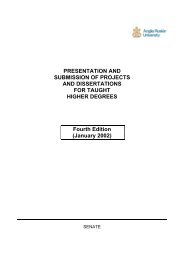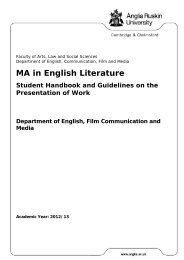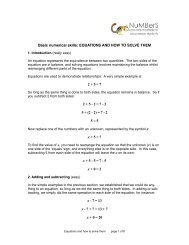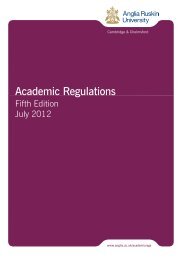Developing skills for successful study
Developing skills for successful study
Developing skills for successful study
Create successful ePaper yourself
Turn your PDF publications into a flip-book with our unique Google optimized e-Paper software.
Student Services<strong>Developing</strong> Skills <strong>for</strong> Successful Study- the “AA --” guideSuccessful <strong>study</strong> involves the following:Aspiration – your desire to learn and motivation to succeed.Acquisition – of the subject knowledge and <strong>skills</strong>Assimilation – making sense of the knowledge and <strong>skills</strong>Analysis – of the in<strong>for</strong>mation and ideas you encounterApplication – of what you learn to the real world, of theory to practiceAssessment – of your progress, by yourself and your tutorsAttitudes – to life, influenced by your learning experiencesAdaptability – being ready to try out different approachesActive learning – taking responsibility <strong>for</strong> your own learning, using active <strong>study</strong>methodsAdvice and guidance – seeking help when you need it from tutors and the LearningSupport TeamAspirationHow <strong>successful</strong> you are as a student depends partly on your motivation <strong>for</strong> doing thecourse.Why have you chosen the course you are <strong>study</strong>ing and what are you hoping toachieve from it? Your answer may include some or all of the following:Gain a qualificationImprove career prospectsDevelop professional <strong>skills</strong>Study Support Service
Student Services Be able to earn more moneyProve to myself I can do itSatisfy other people’s expectations (teachers’, family’s)Interest in the subjectPersonal developmentIf your goals/aims are purely extrinsic, i.e. you see <strong>study</strong> simply as a means to anend, it is possible that you may adopt a surface approach to learning: doing what’srequired; getting through; learning essential facts; focusing on right/wrong answers.If your goals/aims are more intrinsic, i.e. personal, focusing on self-development,you are more likely to view learning as its own goal and adopt a deeper approach tolearning: looking <strong>for</strong> meaning; seeing different interpretations; relating to new ideas;reading round the subject; meeting challenges.Students who have a deeper approach are more likely to achieve better results.However well motivated you are at the outset, there may be times when you need toremind yourself why you are <strong>study</strong>ing your chosen course:Make a list of everything you hope to gain from your studies.Make a list of all the positive things you’ve gained so far from your studies.Make a list of all the difficulties you’ve encountered.Take each difficulty and re-write it as a challenge or opportunity.Identify possible obstacles in advance.Identify ways of dealing with obstaclesSet yourself short-term, achievable goals.When you achieve a goal, reward your success.Talk to someone you know will be supportive.AttitudesYour attitudes to life, your ideas, beliefs and values, as determined by your socialand cultural background and your previous life experiences in general, may haveinfluenced your choice of course of <strong>study</strong>.Study Support Service
Student ServicesThey will also influence your expectations of the <strong>study</strong> experience and your attitudeto <strong>study</strong>.Because of earlier experiences, you may expect to be taught in a <strong>for</strong>mal way fromthe front of the class. You may expect to write assignments in a particular way, andexpect your tutors and fellow students to behave in a certain way.Some teaching methods may challenge these expectations: in HE in the UK there isan emphasis on independent learning. Some aspects of the course material or viewsexpressed may challenge your beliefs: HE students in the UK are expected tointerpret, question and make their own judgements. Adjusting to new ways can beunsettling and may take time, but can also be a positive, beneficial experience.You need first to recognise that you have certain views and prejudices, as have yourfellow students, tutors and the authors of material that you read. Be open to differentviews and be prepared to revise your own views if appropriate.Also be prepared that changes in your own attitudes and understanding maysometimes cause conflict with people from the world outside University who areimportant to you.AcquisitionSuccessful <strong>study</strong> at HE level involves acquiring the specific subject knowledge and<strong>skills</strong> related to your course of <strong>study</strong>. For this you need to be able to:find in<strong>for</strong>mation from a range of sourcesunderstand and access the library facilitiesretrieve in<strong>for</strong>mation from electronic sourcescollect, record and handle datause a range of reading strategieslisten attentivelyStudy Support Service
Student ServicesHowever, this does not just mean passively receiving knowledge or <strong>skills</strong> by just:attending lectures and noting everything the lecturer saysexpecting to be taught all you need to know – have knowledge “poured” intoyoureading at face value, collecting ideasGo to training sessions offered by the library to familiarise yourself with how toaccess the library catalogue and databases <strong>for</strong> your subject.Seek individual help from your subject librarian if necessary.Attend <strong>study</strong> <strong>skills</strong> sessions or refer to the on-line <strong>study</strong> <strong>skills</strong> guides to learn how toread in an active, questioning way, and how to make notes rather than take notes.AssimilationFor <strong>successful</strong> <strong>study</strong> you need to be able to make sense of the knowledge you’veacquired.This involves:reflecting on what you have read/heard/observedconsidering how different areas of <strong>study</strong> link upmaking connections between what you learn and what you knowlooking at things from different anglesStudy Support Service
Student Services sorting in<strong>for</strong>mation by category, groupingre-working, manipulating in<strong>for</strong>mationdiscussing, sharing ideas with othersanalysing in<strong>for</strong>mation and ideasAnalysisTo assimilate you need to develop the ability to analyse and critique.Analysis means breaking things (theories, ideas, arguments, events, situations,practices, procedures) down into their component parts.Critiquing entails comparing and contrasting, evaluating, making judgements.This means examining closely, asking questions.To analyse an incident, <strong>for</strong> example, you might start by asking:What happened?When and where did it happen?Who was involved?What did they do, how did they behave/react?You might go on to ask:What were the main factors?Why was the timing/place important?Why did people act/behave as they did?Why was this approach taken?How effective was the approach?What were the strengths/weaknesses of this approach?How might things have been done differently?What theories applied?What can I learn from this?See the separate guidelines on analytical, critical thinking.ApplicationAssimilating knowledge, making sense of it by analysis and critique, means youwill be better able to apply what you have learnt to the real world.Study Support Service
Student ServicesIn vocational courses such as nursing and teaching, students are expected toconstantly relate theory to practice and vice versa. The whole point of learning isto enable you to be an effective practitioner.Whatever your course of <strong>study</strong>, learning will affect your view of the world, the wayyou develop as a person. One definition of learning is:“A more or less permanent change in behaviour, knowledge or beliefs”AssessmentYour progress with your studies will be assessed by your tutors in a range ofways:Formative assessment provides the opportunity to produce work <strong>for</strong> comment,discussion and guidance as to what areas you need to improve on. It does notcount towards your marks.Summative assessment is what you are marked on. This may include exams;essays, reports, case studies or other written assignments; oral presentations;practical tasks in class; placement per<strong>for</strong>mance.However, don’t just rely on feedback from your tutors as to how you areprogressing. Take responsibility <strong>for</strong>:Evaluate and monitor your own progress.Work out your strengths, what you need to improve on.Think about why a particular learning task was not <strong>successful</strong> and whatyou could do differently another time.Think about how you learn best.Perhaps keep a reflective journal.Study Support Service
Student ServicesAdaptabilityPrevious learning experiences and your personal preferred learning style may haveinfluenced the way you approach <strong>study</strong> and how effective this is.The way you have been taught in the past and the teaching approaches you areexperiencing now may not suit you.On the other hand, your usual learning style may not always be the most effective <strong>for</strong>every learning situation. Analyse your preferred style to identify your strengths andweaknesses. Find out about different learning styles so that you have a “tool kit” ofdifferent approaches to suit different learning situations.There are many theories about learning and learning styles.One theory is that most people have a “left brain” or “right brain” preference. Thebrain is divided into two hemispheres. Each is dominant in different <strong>skills</strong>, but bothhave all the <strong>skills</strong>. The more you use both sides of the brain together, the more onebenefits the other.Left brainLogical thinking styleSequenceCause and effectLogicAnalysisNumbersWordsCalculation/deductionSense of timeReasoningTemporal – one at a timeUses language to name,describe, defineListsChemical <strong>for</strong>mulaeRight brainGlobal thinking styleSeeing the wholeInter-relationshipsMetaphorSynthesisImage, shape, colourRhythmIntuitionEmotionImaginationSpatial – all at onceUses pictures,shape, colourDimensionPattern recognitionPeople can also be divided according to their preferred way of taking in andreproducing in<strong>for</strong>mation. The FEDA Learning Styles Questionnaire can help you todecide whether you are a visual, auditory or active learner. The VARK questionnaireassesses people as visual, auditory, read/write or kinesthetic learners. You can tryout the VARK questionnaire on line at www.VARK-learn.comStudy Support Service
Student ServicesTry adapting the course to suit your own preferred style. For example, if you are an“auditory” learner, dictate written notes onto tape so you can listen to them. If you area visual learner, try mind maps <strong>for</strong> planning, note taking and exam revision.Honey and Mum<strong>for</strong>d (1992) describe learning as a cycle of four stages. They suggestthat people tend to prefer one stage of the cycle. They divide people accordingly intoActivists, Reflectors, Theorists or Pragmatists. Sometimes people get “stuck” in onestyle and cannot move through the cycle. Different styles and strategies may beappropriate <strong>for</strong> different situations. Your preferred learning style may be veryeffective in certain situations. To extend your learning potential, however, you needto be able to move from one stage to another depending on the situation.To find out your preferred learning style, complete the questionnaire devised byHoney and Mum<strong>for</strong>d. The questionnaire is followed by a description of the differentstyles, their relative strengths/weaknesses and tips <strong>for</strong> developing aspects of thatstyle.Favoured byActivistsStage 1Having anexperienceFavoured byPragmatistsFavoured byReflectorsStage 4 Stage 2PlanningReviewingnext stepsexperienceStage 3Concluding fromexperienceFavoured byTheoristsStudy Support Service
Student ServicesActive learningSuccessful <strong>study</strong> means taking responsibility <strong>for</strong> your own learning and developingeffective <strong>study</strong> techniques:Time management:- plan ahead – make semester and weekly timetables- prioritise – make a daily list of “must”, “should” and “would like to”dos.- break each <strong>study</strong> task into smaller tasks- plan backwards from deadlines and allow <strong>for</strong> unexpected delays- make use of small slots of time- make the most of your “best” <strong>study</strong> time- don’t be a work avoider- don’t work <strong>for</strong> hours on end without a breakLectures, seminars, tutorials:- attend regularly- read previous lecture notes, introductory text, discussion material- prepare questions- arrive early to pick up handouts etc.- make effective notes – don’t try to get everything down- afterwards, clarify/compare notes- review notes as soon as possible afterwards, clarify, rework ifnecessary, review at regular intervalsAssignments:- start thinking about an assignment as soon as you get it- be clear about what is required – check module guides <strong>for</strong> learningoutcomes, discuss with others- have a staged approach: planning, research, drafting, editing,proofreading- learn to read in a focussed, questioning way; engage with thereader, make notesExams:- learn key in<strong>for</strong>mation as you go- use revision strategies that use all the senses- find out about memory techniques, mind mapping etc.- make a revision timetable- set specific tasks <strong>for</strong> revision slots – each slot 20-30 minsStudy Support Service
Student ServicesAdvice and guidanceFactors such as your physical wellbeing, your mental and emotional wellbeing, yourpersonal circumstances (family/work commitments, finance etc.), as well as yourbeliefs and values, your previous learning experiences and your motivation, can allinfluence the success or otherwise of your studies.Be prepared to seek help if you need it.Sources of further guidanceAnglia Ruskin University’s Learning Support and Disability Resources Team, On-line<strong>study</strong><strong>skills</strong> guidesCottrell, S. (2003) The Study Skills Handbook, 2nd ed., Basingstoke: PalgraveMacmillanCottrell, S. (2005) Critical Thinking Skills: <strong>Developing</strong> Effective Analysis andArgument. Basingstoke: Palgrave MacmillanCrème. P. and Lea, M.R. (2003) Writing at University, 2 nd ed., Maidenhead: OpenUniversity PressFairbairn, G.J. and Winch, C. (1998) Reading, Writing and Reasoning, Buckingham:Open University PressGreetham, B. (2001) How to Write Better Essays, Basingstoke: PalgraveRose, J. (2001) The Mature Student’s Guide to Writing, Basingstoke: PalgraveStudy Support Service


